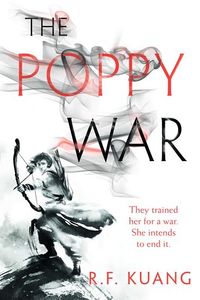Difference between revisions of "The Poppy War by R.F. Kuang"
From Book Trigger Warnings
| (One intermediate revision by one other user not shown) | |||
| Line 23: | Line 23: | ||
*Cannibalism | *Cannibalism | ||
*Character death | *Character death | ||
| + | *Classism | ||
| + | *Colonisation | ||
*Decapitation | *Decapitation | ||
| + | *Dismemberment | ||
*Drugs | *Drugs | ||
| + | *Drug abuse | ||
*Fatphobia (unchallenged) | *Fatphobia (unchallenged) | ||
*Fire | *Fire | ||
| + | *Forced marriage | ||
*Genocide | *Genocide | ||
*Gore | *Gore | ||
| + | *Grief | ||
| + | *Hate crime | ||
*Hostages | *Hostages | ||
*Human experimentation | *Human experimentation | ||
| Line 41: | Line 48: | ||
*Rape (past, recollected) | *Rape (past, recollected) | ||
*Self-harm | *Self-harm | ||
| + | *Sexual violence | ||
*Skeletons | *Skeletons | ||
| + | *Slavery | ||
| + | *Suicidal thoughts | ||
*Torture | *Torture | ||
*Violence (including against children) | *Violence (including against children) | ||
Latest revision as of 23:04, 6 January 2023
- This article is about the book. For the series, see The Poppy War by R.F. Kuang (series).
The Poppy War
| Author(s) | R.F. Kuang |
|---|---|
| Published | May 1, 2018 |
| Publisher | Harper Voyager |
| Genre(s) | Fantasy |
| Age group | Adult |
The Poppy War by R.F. Kuang is an adult fantasy novel, originally published on May 1, 2018. It is the first book in The Poppy War series.
Trigger Warnings
- Abandonment
- Ableism
- Abuse (emotional and physical)
- Addiction
- Animal death/cruelty
- Assault
- Blood
- Bones
- Bullying
- Cannibalism
- Character death
- Classism
- Colonisation
- Decapitation
- Dismemberment
- Drugs
- Drug abuse
- Fatphobia (unchallenged)
- Fire
- Forced marriage
- Genocide
- Gore
- Grief
- Hate crime
- Hostages
- Human experimentation
- Infertility
- Massacres
- Menstruation
- Misogyny
- Mutilation
- Murder (including children)
- Profanity
- Racism
- Rape (past, recollected)
- Self-harm
- Sexual violence
- Skeletons
- Slavery
- Suicidal thoughts
- Torture
- Violence (including against children)
- War
Representation
An asterisk (*) indicates that the author openly identifies with that identity.
- East-Asian main character and cast*

